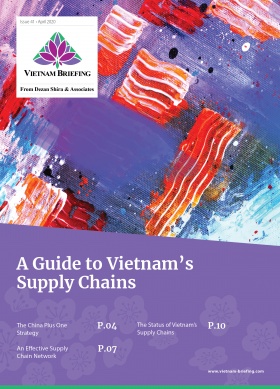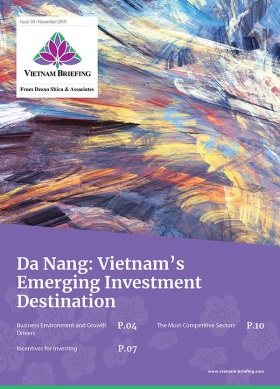Why Investors Should be Excited About Vietnam: Provincial Competitive Index 2019
- Vietnam’s business environment continued to improve as reflected in this year’s Vietnam Provincial Competitive Index 2019.
- Improving economic governance, infrastructure, administrative procedures, and transparency were among the many factors that contributed to higher business optimism.
- Quang Ninh province topped this year’s PCI for the third consecutive year and also raised the bar proving to be a reliable business destination.
Business optimism in Vietnam continues to improve as per the latest Vietnam Provincial Competitive Index (PCI) 2019. With over 760,000 firms operating in Vietnam up from 105,000 in 2005, the survey is a testament to continued improvements being enacted by the local provincial governments and authorities.
The improved business optimism is attributed to an improvement in entry procedures, reduction in expropriation risk and efforts to deal with corruption.
Please note that the PCI 2019 was conducted before the COVID-19 outbreak and therefore some responses and future business plans are likely to be different as a result of the pandemic.
The PCI introduced in 2005, is a collaborative report by the Vietnam Chamber of Commerce and Industry (VCCI) and the US Agency for International Development (USAID). It looks at several criteria including informal costs, administrative procedures, and infrastructure related to the business environment of Vietnam. It looks at reforms made by provincial and city governments that promote the private sector.
In 2019, it surveyed more than 8,500 domestic firms in 63 provinces and over 1,500 Foreign-invested enterprises (FIEs) in 20 provinces and cities. It also surveyed more than 2,000 newly established businesses.
The PCI index scores measure 10 sub-indices which are:
- low entry costs for business start-ups;
- easy access to land and security of business premises;
- a transparent business environment and equitable business information;
- minimal informal charges;
- limited time requirements for bureaucratic procedures and inspections;
- minimal crowding out of private activity from policy biases toward the state, foreign, or connected firms;
- proactive and creative provincial leadership in solving problems for enterprises;
- developed and high-quality business support services;
- sound labor training policies; and
- fair and effective legal procedures for dispute resolution and maintaining law and order.
The provinces and cities surveyed can attain a maximum score of 100 points.
For the third consecutive year, Quang Ninh province topped the list with a score of 73.40, beating its own record from 2018. This was followed by Dong Thap, retaining its second position from last year, followed by Vinh Long and Bac Ninh with Da Nang finishing in the top 5. Bac Ninh made the jump from 15th spot a year earlier.
Hanoi retained its position at number 9 in the rankings, however, Ho Chi Minh City slipped to 14th spot from last year’s ranking of 10.
Highlights from the Vietnam Provincial Competitive Index 2019
Improvement in governance: The gap between the best and worst-performing provinces is reducing and over time there has been continuous improvements in the governance of all provinces. Nevertheless, complex governance problems such as access to information and petty corruption remain concerns.
Policy implementation: 54.1 percent of businesses rated that local authorities’ attitude towards the private sector as ‘positive’ up from 46.2 in 2018 and 35 percent in 2015. 80 percent of firms agreed that provincial governments were flexible and facilitated a favorable business environment. Firms also stated that their problems were addressed through business dialogues with local authorities.
Less favoritism towards state and foreign investors: Favoritism towards specific businesses seemed to have declined in 2019. 21 percent of respondents agreed that state-owned enterprises found it easier to win state contracts down from 27 percent in 2015. Despite a more equal business environment, favoritism towards large and connected firms remains high, which will require more efforts to level the playing for the private sector, particularly small and medium-sized businesses (SMEs).
Corruption: Respondents continued to report positive perceptions about declining corruption and informal charges at the local level. 21.6 percent of businesses said that paying bribes is common to influence court decisions compared to 28.8 percent in 2018. 41.2 percent claimed that is necessary to pay a commission to win procurement contracts compared to 48.4 in 2018. While this improved, 36 percent claimed that they had to pay informal charges to accelerate land procedures compared to 30.8 percent in 2018. This shows that a sustained effort is needed to further reduce facilitation fees.
Reforms in administrative procedures: While reforms to administrative procedures continue, some are still lacking. 81.3 percent of firms approved the way provincial officials handled work, an increase from 74.7 percent in 2018. 72.6 percent of respondents also spent less time on administrative procedures as compared to 69.8 percent in 2018. However, land, taxes and fees, social insurance as well as construction and transportation were rated as burdensome.
Transparency: Access to information has always been a problem in Vietnam but there have been improvements. On a scale to 1 to 5 with 1 being Impossible and 5 being Very Easy, access to planning documents scored to 2.50 points as compared to 2.38 in 2018. Improvements to provincial website quality were also made and is especially important as Vietnam move towards Industry 4.0. Despite advances, only 65 percent of firms said they received information that was requested from provincial authorities a fall from 68.8 percent in 2018.
Entry procedures: FIEs also reported an improvement in entry procedures. 92 percent of firms stated that they obtained all the necessary paperwork within three months while 56 percent of businesses were registered in less than one month. Inspections also decreased however, fire and safety and tax authority inspections continued to be problematic. Nevertheless, regulatory improvements over the past four years saved businesses 38 days in start-up time.
Governance and infrastructure correlated
Binh Duong, Bac Ninh, Dong Nai, Thai Nguyen, and Bac Giang were rated as the top five provinces with the best infrastructure. These provinces are also major industrial hubs. The survey results also showed that infrastructure in Vietnam has improved since 2014. As with previous years, there is a correlation between the quality of governance and infrastructure. Provinces that performed well in governance also typically had higher-quality infrastructure.
Business challenges
The top five challenges facing businesses were finding customers, getting credit, hiring employees, finding business partners, and market downturns. Other issues that were highlighted were concerns relating to unpredictability in regulatory issues. Nevertheless, business optimism remains high with 51 percent of firms planning to expand operations in the next two years, compared to 49.3 percent in 2018. Among foreign investors, 53 percent plan to expand in the next two years, a decline from 55 percent in 2018. However, it’s important to note that the survey was taken before the COVID-19 pandemic and the responses are likely to be different due to the economic fallout.
Foreign investors in Vietnam
As Vietnam pushes for high-end manufacturing, there are more firms producing higher-technology goods and hiring skilled labor. Most investors are from Asia consisting of South Korea, Japan, and Taiwan topping the list. Foreign investors are mostly manufacturers in the fabricated metal industry followed by rubber and plastic and computer and electronics. Less than 1 percent of FIEs were involved in agriculture or mining. There was also a significant growth in firms operating in energy provision in 2019.
Businesses producing computer and electronics rose to 6.7 percent from 2.73 percent in 2016 while firms engaged in garment production declined to 3.2 percent from 6 percent in 2016. This shows the growing China+1 theme of firms moving more higher-end production to Vietnam.
Automation and digital technology
In 2019, the PCI focused on automation and technology, as a theme, which is likely to affect domestic and international firms in Vietnam. In the past three years, 67 percent of both foreign and domestic investors have automated some operations, while 75 percent plan to automate new tasks over the next three years. The motivation for automating were to reduce labor costs as well as to integrate with global supply chains. For foreign firms, another motivation for automation was labor unrest.
Only 12.6 percent of domestic firms plan to increase employment as a result of automation. In contrast, 17.8 percent of FIEs plan to increase employment, though 33 percent also plan to reduce employment. The effects of automation will affect industries differently with some decreasing employment while others hiring more and training for further opportunities.
Positive business optimism
The results of the PCI 2019 survey show a strong business environment in Vietnam. As in previous years, economic governance has improved across the country and this trend continues. Most recently, the government issued Resolution No 68/NQ-CP to cut or simplify at least 20 percent of regulations for businesses through 2025. The government also plans to cut at least 20 percent of business procedures compliance costs.
The positive business optimism will also help, particularly as firms feel the economic impact of COVID-19. Vietnam, however, has managed to control the pandemic and has reopened for business. This shows that Vietnam remains a safe place to do business reiterating as it has gained an early advantage in relation to its peers.
Challenges remain, but if authorities address the issues in the survey, Vietnam can continue improving and help develop a conducive business environment, particularly in the context of China+1 and COVID-19.
About Us
Vietnam Briefing is produced by Dezan Shira & Associates. The firm assists foreign investors throughout Asia from offices across the world, including in Hanoi and Ho Chi Minh City. Readers may write to vietnam@dezshira.com for more support on doing business in Vietnam.
- Previous Article Quang Ninh and Guangdong – Choosing your China+1 Location
- Next Article Q&A: COVID-19 and Response to Supply Chain Disruption in Vietnam







